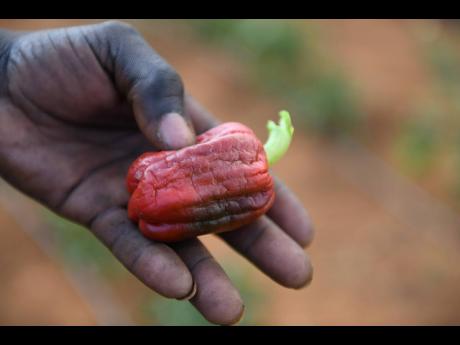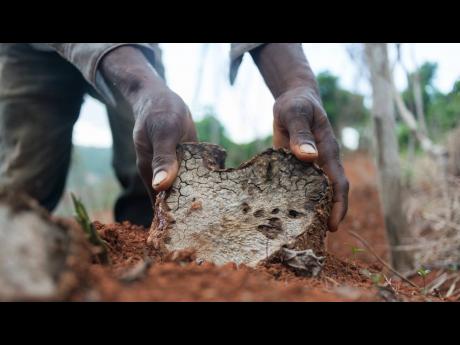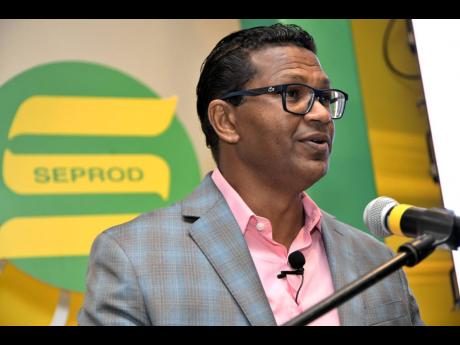More price shocks loom as food-security crisis worsens
A food-supply crisis is unfolding globally, and Jamaica could find itself in dire straits if the Government fails to act, Group CEO of Seprod, Richard Pandohie, has warned. His outlook was buttressed by Andrew Gray, managing director of Gray’s...
A food-supply crisis is unfolding globally, and Jamaica could find itself in dire straits if the Government fails to act, Group CEO of Seprod, Richard Pandohie, has warned.
His outlook was buttressed by Andrew Gray, managing director of Gray’s Pepper Products, who said enough was not being done to promote agro-processing locally.
Already, several countries have resorted to protectionism, reducing or halting altogether global exports in a bid to meet and ensure domestic demands.
Indonesia, the world’s leading producer of palm oil, banned exports on Friday amid inflation spikes. Argentina, too, announced a ban on beef exports before relenting, opting, instead, to increase export taxes.
Pandohie said that should supply-chain and food-security issues worsen, Seprod’s first priority will be to ensure supply to Jamaica and the rest of the Caribbean.
The coming months have been forecast as fraught with difficulty for consumers and businesses, Pandohie said.
“What you’re going to find is that countries which have the capacity are going to look at themselves first and how they protect their market. They are going to react by restricting exports,” he said in a recent Gleaner interview.
The Seprod CEO said the negative effects of the coronavirus pandemic have been exacerbated by the Russia-Ukraine war, with the latter country being unable to produce or export grains.
Ukraine and Russia together supply more than a quarter of the world’s wheat, with disruption expected to push food prices higher.
Sanctions on Russia and its ally, Belarus, a leading exporter of potassic fertiliser, also threaten global agriculture.
Referencing the hoarding of vaccines by developed countries at the height of the COVID-19 pandemic, the Seprod boss cautioned that they could take a similar posture in safeguarding food supplies.
He argued that developed countries such as China and India, with an abundance of resources, are likely to buy and store more for their emergency food reserves, leaving developing states in the cold.
“We don’t have anything like that. So we are very, very exposed and vulnerable. So what our consumers are facing are price shocks. We’re not at the peak yet. We’re now looking at a next set of price increases, and on top of that, as a food importer, what I’m seeing increasingly is that it’s getting more and more difficult to get supply,” said Pandohie.
Harping on the fact that Jamaica is a huge importer of food, with the bill for inflows four times its exports, Pandohie insisted that the Government must treat the latest development as a national crisis.
Jamaica, in 2020, imported US$900 million in food, down from the 2019 figure of US$1 billion.
“I am concerned because we have so much idle lands. We have good weather. We have water. But we’re not treating this thing as a crisis and an opportunity at the same time,” he stressed.
Pandohie said that there is no avoiding the hardship on the horizon, but the effects of the shortages expected in supply can be mitigated with proper planning.
“We don’t have to eat wheat. We can eat breadfruit. We can grow short-term crops which take three months,” he said, adding that 30 per cent of produce is wasted in the field because Jamaica has limited post-harvest storage facilities.
Additionally, he said farmers could be incentivised to ensure continued production.
The CEO argued also that a more aggressive approach must be taken to encourage agricultural and agro-processing outputs, suggesting that the singular focus on construction be shifted to the sector.
“We cannot eat the houses we’re constructing. We can’t eat the road. We’re going to need food to survive ... .
“At the end of the day, one of the things that affects Government the most in terms of their credibility and tenure is when people can’t afford the basic necessities of life,” he said.
Pandohie suggested that the Government move to install storage facilities across the country, absorbing that cost from farmers; assist with acquiring post-harvest technology; and subsidise the associated electricity costs.
He said the move would be in line with countries such as the United States and the United Kingdom, where agriculture is heavily subsidised, in turn spurring the economy.
“We’re not taking it seriously. Jamaica needs more than one pillar for our prosperity drive. A part of that pillar has to be production,” he stressed, adding that there is no more room for committees, task forces, and advisory groups.
Gray said that if Jamaica is to weather the food-shortage storm brewing, post-harvesting must become a serious practice.
Referencing the US, Gray pointed to the preservation of apples in cold-storage facilities to meet year-round demands.
Gray told The Gleaner that in many instances, local farmers are forced to dump unsold produce after a week due to the lack of storage facilities.
“You talk about onion production. When you go to the supermarket, a lot of the local onions that you buy are spoilt. With onion production, once you reap it, you have to put it in a dryer. That gives it the shelf life,” he explained.
“A lot of the farmers don’t have that facility. So they just go from farm to supermarket. It needs an intermediary stage,” he said, adding that imported onions do not have those complications.
Gray said while there are cold-storage facilities at several agro-parks, those are not enough to sustain the farm economy.




